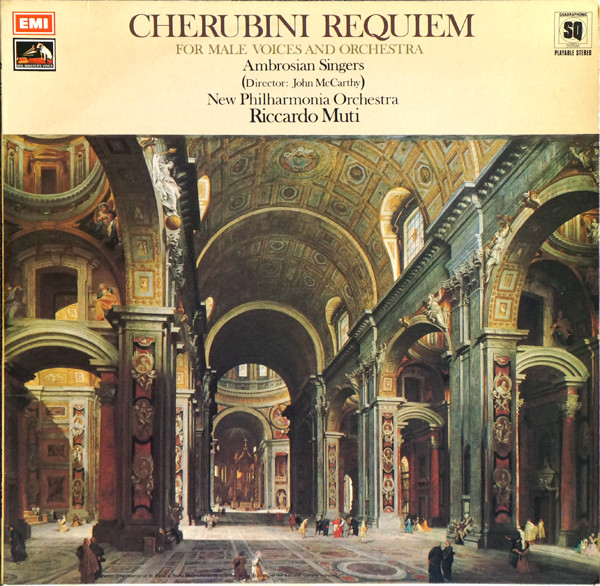The Better Requiem?
It would be a shame for a listener to stop at Cherubini's Requiem in C minor, for I think the Requiem in D minor of 1836 his superior work.
There is a whole lot more import here, supplied by the minor key, the chorus for men's voices only, and its creation for Cherubini's own funeral.
The Kyrie is of a particularly dour mood, both prayerful and powerful in its slow motion. The linking Graduale is surprising in that it is for a cappella chorus only, continuing the personal spirit of the work. It sounds hard as snot to keep in tune, too!
Cherubini rushes through the text of the Dies Irae, first in imitative hushed excitement, but finally in full-throated terror by the Tuba Mirum. The composer slows things down by the time he reaches the Recordare, Confutatis, and Lacrimosa, but is characterfully varied in setting each. I wonder if Verdi knew of Cherubini's Requiem, as it won't be the first time I hear some possible influences.
The Offertorium is an unusually spirited and upbeat affair, and thankfully Cherubini returns to a fugal form for the Quam Olim Abrahae, after the texture was completely missing in his preceding Mass. The Sanctus, and its Hosanna, brings back a stately, uplifting power.
The Pie Jesu recalls the earlier Gradual by setting a mostly a cappella chorus with brief orchestral interludes. Finally, in the Agnus Dei, Cherubini is finally willing to let his work die away in peace, something I have been waiting for.
This work was Riccardo Muti's first recording of Cherubini's orchestrated Masses from 1973. The men's chorus is very powerful, although I could still imagine more numbers behind their sound, as I hear individual voices standing out every now and then.
In the choral parts, I sense an old-fashioned Renaissance sense of dissonance that rears its head at judicious times amongst the mostly homophonic settings. The high flying tenor part and the difficult a cappella choruses remind me of Berlioz, although that composer would be infuriated by the comparison. The orchestra mostly doubles in this music, but there are a few spurts of instrumental color here and there.
Otherwise, this is a very successful venture, where Muti and his London players and Ambrosian Singers bring out the intimacy and power of this music most effectively.
Work
Requiem in D minorI. Introit & Kyrie (10.22)
II. Graduale (4.12)
III. Dies Irae (13.35)
IV. Offertorium (7.06)
V. Sanctus & Benedictus (3.54)
VI. Pie Jesu (3.49)
VII. Agnus Dei (8.40)
Ensembles
Ambrosian Singers
New Philharmonia Orchestra
Riccardo Muti, conductor
Label: EMI
Year: 1975
Total Timing: 52.00
A fitting end to Cherubini's contribution to his series of Masses. It must have been a moving sendoff for the composer.
The work is full of import and wonderful music, powerfully performed by Muti & Co.
Find more Cherubini recordings HERE!




Comments
Post a Comment